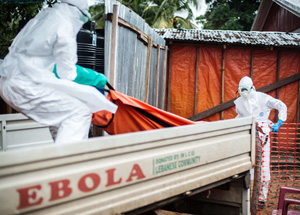Geneva, Oct 23: The number of people with Ebola is set to hit 10,000 in West Africa, the World Health Organisation said, as the scramble to find a cure gathered pace.
The UN's public health body said 9,936 people in Guinea, Liberia and Sierra Leone - the three countries at the epicentre of the world's worst-ever Ebola epidemic - have contracted the disease. In total, 4,877 people have so far died.
With experts warning the rate of infections could reach 10,000 a week by early December, researchers around the world are scrambling to beat the tropical fever, for which there is currently no licensed treatment or vaccine.
The figures were released as the WHO in Geneva yesterday held its third round of emergency talks on Ebola, discussing efforts to combat the tropical fever. The talks are expected to last two days.
Meanwhile doses of the experimental rVSV vaccine against Ebola arrived at the Geneva University Hospital from Canada.
The WHO is to coordinate trials of the vaccine in Geneva alongside those already under way in Germany, Gabon and Kenya.
The vaccine, developed at the National Microbiology Laboratory in Winnipeg, is one of two experimental Ebola vaccines identified by the WHO as having shown promising results when tested on monkeys.
WHO assistant director general Marie-Paule Kieny said the goal was to be able to ship initial supplies to Africa by early 2015, though mass vaccination campaigns are not yet on the cards.
"There is a very strong movement now from governments of many countries to push as quickly as possible these vaccines into real-world use," she said.
A key aim is to help guard health workers against Ebola - some 240 have died so far as they strive to care for desperate patients.
At the same time, the American Institute of Health announced it they had begun a clinical trial of a vaccine trialling it on 39 people. However, even if successful, the vaccine would not be available until next year.
Also yesterday US pharmaceutical giant Johnson and Johnson announced it would spend USD 200 million to accelerate an Ebola vaccine programme that is in development. It plans tests on volunteers in January.
The Red Cross said it would be at least four months before the epidemic is contained, but only if all necessary steps are taken.
"It will be possible, as it was possible in the past, to contain this epidemic within four to six months" if the response is adequate, said Elhadj As Sy, chief of the International Federation of Red Cross and Red Crescent Societies (IFRC).





Comments
Add new comment